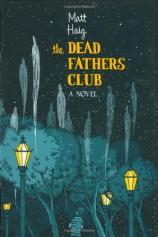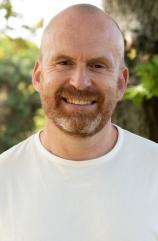The Dead Fathers Club
About the Book
The Dead Fathers Club
The plot may strike one as oddly familiar. Following the premature death of his beloved father, a young man is visited by the father’s ghost. The spirit urges the youth to take vengeance upon a morally ambiguous uncle, who may have had a hand in the father’s death and who now has romantic designs on the dead man’s widow. Torn between loyalty to his father and his moral obligations to the living, the young man is plagued by indecision. Although he yearns to bring peace to his father’s soul by killing the apparent murderer, he hesitates, wondering what kind of peace can truly be won by giving the wheel of violence another turn.
Recognizable as it all seems, the scene of Matt Haig’s ingenious novel The Dead Fathers Club is not Denmark, but the working-class English town of Newark-on-Trent. The only castle in sight is not Elsinore, but the Castle and Falcon pub, owned and operated by Brian Noble until the suspicious car accident that claimed his life. Furthermore, Haig’s Hamlet figure is a far cry from the brooding, intellectual scholar who returns from Wittenberg to find his life in tatters. He is, instead, eleven-year-old Philip Noble, an isolated, introspective boy who wrestles with his dead father’s stark, insistent command: He must kill his seemingly kindly Uncle Alan, who, as an experienced garage mechanic, possessed both the knowledge and the opportunity to tamper with his late brother’s car. As Philip looks on, motive is soon added to means and opportunity: Not only does Alan swiftly step in to take charge of Brian’s pub, but he also promptly proposes marriage to Philip’s mother. As Philip contends with powerful emotions of grief, anger, and jealousy, he must also confront a battery of almost unanswerable questions. Is his father’s ghost telling him the truth, or is he duping his son into committing a series of unconscionable crimes? Is Uncle Alan sincere in his apparent indulgence and generosity toward Philip, or is he, as the ghost insists, secretly plotting to kill both Philip and his mother? And, as another writer once put it, is it nobler in the mind to suffer the slings and arrows of outrageous fortune, or to take arms against a sea of troubles and, by opposing, end them?
Enlivening this remarkable novel from start to finish is the narrative voice of Philip himself. Lonely, misunderstood, but thoughtful beyond his years, Philip struggles to express his complex fears of both life and death in the journal that his school counselor encourages him to keep. As Matt Haig leads us to question the motives of Philip’s family and friends, as well as the true nature of Philip’s father’s ghost, he gradually evolves a brilliant contradictory portrait of his central character. Is he precociously philosophical or pathetically mad? Is he a foolish boy, or a fount of strange forbidden wisdom? Must he follow Hamlet’s destiny to the bitter end, or will he summon the courage to regain control of his fate? Not until the shattering conclusion do the deep mysteries of the story become clear.
The Dead Fathers Club
- Publication Date: February 1, 2007
- Hardcover: 336 pages
- Publisher: Viking Adult
- ISBN-10: 0670038334
- ISBN-13: 9780670038336




